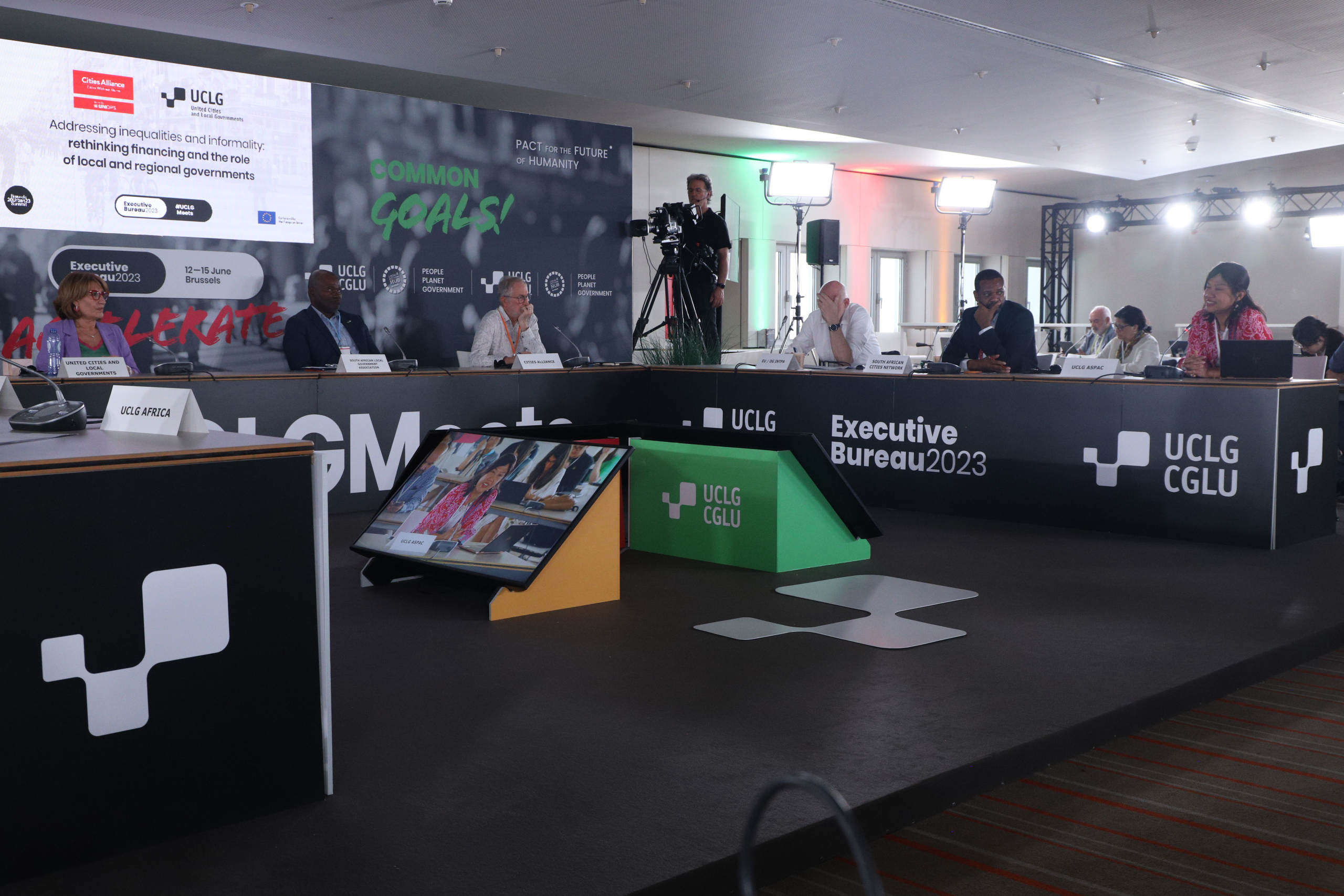Tackling the roots of inequalities and their relationship with the economic system, governance models, territorial and urban development, as well as restructuring global financial systems to respond to the needs of local communities, were at the centre of the ‘Addressing inequalities and informalities: rethinking financing and the role of local and regional governments’ session, co-organized by United Cities and Local Governments (UCLG) and Cities Alliance in the afternoon of 14 June 2023.
Since the adoption of the SDGs, progress in their implementation has fallen short. The world faces a polycrisis context that impedes the advancement of global agendas at the expected and urgent pace. Access to finance and the international finance architecture remain inadequate, hindering collective efforts from local and regional governments.
To truly make a difference, addressing inequalities and informalities, ensuring a just transition to the climate crisis, and reevaluating the financial structure are priorities. Leaving no one behind and no place behind is not only a vision for 2030 but also current day-to-day strive. The establishment of clear connections between the global commons, global public goods, and the needs of people and local communities within the global financial systems are a starting point for the urgent transformation required.
Local and regional governments can contribute to advancing mechanisms and legislative changes towards a system that promotes local and territorial equality. A feminist and care-based approach to economic local budgets or the compensation of unfunded mandates of local governments should be properly addressed in the redefinition of the financial structure. Shifts are needed to transform economic models and achieve a more inclusive financial ecosystem to channel funding for services and solutions at the local level.
Adopting a caring approach for investment screening, grounding financial decisions on people’s needs, prioritizing sustainability and the protection of commons, increasing public engagement mechanisms, strengthening the capacity of local and regional institutions, and managing finance and the economy based on human development and well-being were some of the proposals put forward by the panelists.
As Greg Munro, Director of Cities Alliance, said, “To respond to inequality at a local level, we need one integrated approach with the citizen as the beneficiary. We can’t afford to have separate sectoral responses.” Emilia Saiz, Secretary General of UCLG, also reinforced that message at the closing of the session: “The current system accepts inequalities. To address this, justice and trust must be guaranteed for all. Local and regional governments are working on the frontlines to ensure communities access local public services. Only in this way can we ensure that inequalities are addressed.”
Jean Pierre Elong Mbassi – Secretary-General of UCLG Africa
You cannot combat, or fight inequalities with you being acquainted with inequalities because all that you will be adding is more inequality as the system is being under inequalities. So, you need to turn your lens differently, looking at equality from a perspective. Equality means two things: the dignity of every human being and the avoidance of any discrimination.
Bernadia Irawati Tjandradewi – Secretary-General of UCLG ASPAC
For the Asia-Pacific, it is very important to reduce inequalities, we need a very good enabling environment for cities and local governments. This includes financial options, legislation, decentralization, and of course, capacity-building development for local governments. Another thing we should stress is the speed of preservation and protecting nature as well as the speed of sustainable development should be faster than the speed of destroying everything. We need more actions, and we need to have more campaigns on inequalities. There are already solutions everywhere in the world, including in the Asia-Pacific, but how these sporadic solutions can be upscaled to the international level for a greater impact and better results?
Neila Akrimi-Kemperman – Head of Strategies and Networks at VNG1 International Founder and CEO of VNG International Center of Innovative Local Governance Chair UCLG-CIB
Inequality exists everywhere and is pressuring with challenges that the world is witnessing now: the crises all over the world, be it after the COVID-19 pandemic, economic, social, or climate, are making us as people very vulnerable. Inequalities are getting wider, deeper, and more present. The urban solutions to those crises are inspiring, but there is an urgent need to rethink financing, narratives, collaborations, and partnerships. We cannot continue doing things the same way. The collective effort should be transformed into collective responsibility.”

